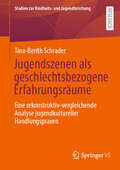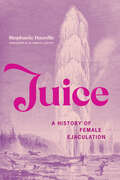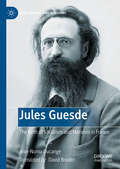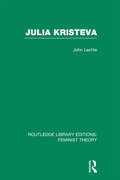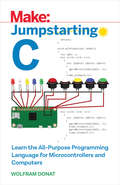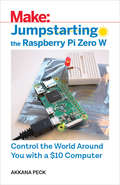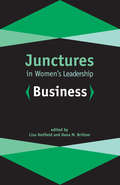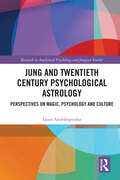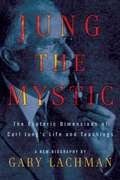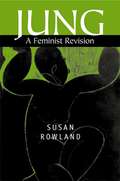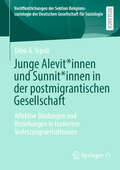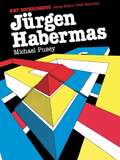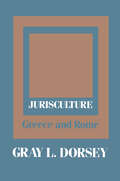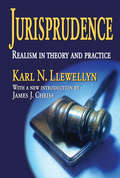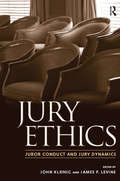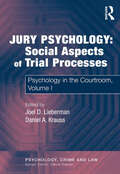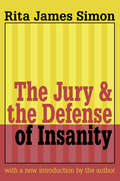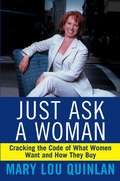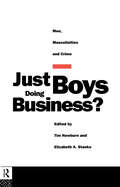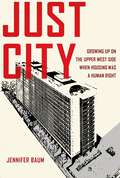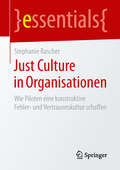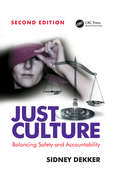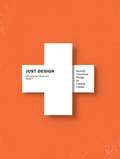- Table View
- List View
Jugendszenen als geschlechtsbezogene Erfahrungsräume: Eine rekonstruktiv-vergleichende Analyse jugendkultureller Handlungspraxen (Studien zur Kindheits- und Jugendforschung #12)
by Tina-Berith SchraderJugendszenen wie Gothic und Metal sind, wie auch andere jugendkulturelle Phänomene, Räume, in denen Geschlechterrollen verhandelt, neu gestaltet oder reproduziert werden. Tina-Berith Schrader untersucht in diesem Buch mithilfe der dokumentarischen Methode anhand von Gruppendiskussionen auf Musikfestivals, wie Geschlecht in diesen Szenen erlebt und ausgehandelt wird und welche Auswirkungen dies auf Partizipation, Praktiken und Stile hat. Dabei wird ein breites Spektrum theoretischer Ansätze aus der Geschlechter- und Jugendkulturforschung berücksichtigt. Die Forschungsergebnisse beleuchten vier zentrale Kontexte, darunter die Szene als alternativer sozialer Raum und das Musikfestival als Ort geschlechtsspezifischer Erfahrungen. Ergänzt wird dies durch eine Typologie, die Szenenspezifik und gemeinsame Erfahrungsräume sichtbar macht.
Juice: A History of Female Ejaculation
by Stephanie HaerdleThe fascinating, little-known history of female sex fluids through the millennia.For over 2000 years, vulval sex fluids were understood to be a natural part of female pleasure, only to become disputed or categorically erased in the twentieth century. Today what do we really know about female ejaculation and squirting? What does the research show, and why are so many details unknown? In Juice, Stephanie Haerdle investigates the cultural history of female genital effluence across the globe and searches for answers as to why female ejaculation—which, according to some reports, is experienced by up to 69 percent of all women and those who have vulvas upon climaxing—has been banished to the margins as just another male sex fantasy.Haerdle charts female juices from the earliest explanations in the erotic writings of China and India, to interpretations of the fluids by physicians, philosophers, and poets in the Middle Ages and early modern period, to their denial, contestation, and suppression in late nineteenth-century Europe. As she shows, the history of ejaculation and squirting is a history of women, their desires, and the worship and denigration of the female body, as well as the cultural concepts of pleasure, sexuality, procreation, the body, masculinity, and femininity. By examining the fantasies and fears that have long accompanied them, Juice restores female gushes to their rightful place in our collective understanding so that they can once again be recognized, named, and experienced.
Jules Guesde: The Birth of Socialism and Marxism in France (Marx, Engels, and Marxisms)
by Jean-Numa DucangeWhat explains France’s unique Left? Many works have reflected upon the importance of Marxism in France, yet few studies have been devoted to the man who did most to introduce Marxism into its political culture: the today near-forgotten figure of Jules Guesde. It was with Guesde that Karl Marx drafted the world’s first Marxist program, and Guesde who aroused the enthusiasm of countless worker-militants who saw him as their most important leader. Jules Guesde represents the first book-length study of the French socialist leader translated into the English language. For the radical Left today, Guesde is often considered a dogmatist who supported the Union sacrée during World War I and rejected the Bolshevik revolution; for the governmental Left, he embodies an intransigent ideologue who held back the modernization of the French Left. Throughout Jules Guesde, Jean-Numa Ducange argues that it is impossible to study the history of the French socialist movement without a close look at this singular figure and offers a fuller picture of the deep transformations of the Left and Marxism in France from the late 19th century up to the present. This scholarly biography of Jules Guesde seeks to put Guesde’s record on a properly historical footing, closely analysing both archival sources and accounts by his contemporaries. Chapter One begins with his early life and the mark left on him by the Paris Commune and exile. Chapter Two emphasises Guesde’s importance as leader of a distinct current of French socialism, recognised by figures like Karl Marx and Friedrich Engels. Chapter Three sees Guesde become an MP for working-class Roubaix, exploring the contradictions between his revolutionary rhetoric and concrete political practice. Chapter Four turns to the years following his electoral defeat in 1898 and his renewed intransigence in the period of the Dreyfus affair and rivalry with Jaurès. Chapter Five explores his key role in the formation of a united Socialist Party. Chapter Six examines the test of World War I and Guesde’s anguish at the divisions of French socialism. The book then concludes with an examination of Guesde’s contested legacy, as both a “founding father” and figure subject to often pejorative framings.
Julia Kristeva: Feminist Theory: Julia Kristeva (rle Feminist Theory) (Routledge Library Editions: Feminist Theory)
by John LechteA leading literary critic and psychoanalyst, Julia Kristeva is one of the most significant French thinkers writing today. In this up-to-date survey of her work, John Lechte outlines fully and systematically her intellectual development. He traces it from her work on Bakhtin and the logic of poetic language in the 1960s, through her influential theories of the ‘symbolic’ and the ‘semiotic’ in the 1970s, to her analyses of horror, love, melancholy and cosmopolitanism in the 1980s. He provides an insight into the intellectual and historical context which gave rise to Kristeva’s thought, showing how thinkers such as Roland Barthes, Emile Benviste and Georges Bataille have been important in stimulating her own reflections. He concludes with an overall assessment of Kristeva’s work, looking in particular at her importance for feminism and postmodern thought in general. Essential reading for all those who wish to extend their understanding of this important thinker, this first full-length study of Kristeva’s work will be of interest to students of literature, sociology, critical theory, feminist theory, French studies and psychoanalysis.
Jumped In: What Gangs Taught Me about Violence, Drugs, Love, and Redemption
by Jorja LeapWhen Jorja Leap began studying Los Angeles gang violence in 2002, she encountered a myriad of proposed solutions to the seemingly intractable "gang problem" and set out to discover what was really going on. The stakes--then and now--could not be higher: a child or teenager is killed by gunfire every three hours and homicide is the leading cause of death for African American males between the ages of fifteen and thirty-four. In Jumped In, Leap brings us stories that reach behind the statistics and sensational media images to the real lives of those stuck in-and trying to escape-"la vida loca." With the eye of an anthropologist and a heart full of compassion, this small, tough woman from UCLA travels some of the most violent and poverty-stricken neighborhoods, riding along in police cruisers and helicopters, and talking with murderers and drug dealers, victims and grieving mothers. Through oral histories, personal interviews, and eyewitness accounts of current and former gang members, as well as the people who love and work alongside them, readers come to understand both the people pulled into gangs and those trying mightily to forge alternatives and help their community. In delving into the personal lives of current and former gang members, Leap aims not only to find out what leads them to crime and how to deal most effectively with gang activity, but also to hear the voices of those most often left out of the political conversation and to learn from leaders who offer a different kind of hope, through community outreach and jobs programs. As she forges lasting friendships in this community and becomes immersed in others' triumphs and tragedies, Leap's personal and professional lives intersect in sometimes incendiary ways. With a husband in the Los Angeles Police Department and a daughter in adolescence, she faces plenty of family dilemmas herself. Ultimately, Jumped In is a chronicle of the unexpected lessons gang members taught her while she was busily studying them, and how they changed her forever.
Jumpstarting C
by Wolfram DonatAll Make Jumpstart books provide a quick way for makers to "jumpstart" their knowledge of a certain topic.Jumpstarting C takes the reader on a 50-page journey, from installing C on a Raspberry Pi, to creating their first "Hello World" program in C, to building and programming a handheld 4-color memory game using C, pushbuttons and LEDs.
Jumpstarting the Raspberry Pi Zero W
by Akkana PeckGet up and running quickly with the new Jumpstarting ebook series from Make:. The super-small $10 Raspberry Pi Zero W includes wireless LAN and Bluetooth connectivity and is 40% faster than the original Raspberry Pi.
Junctures in Women's Leadership: Business
by Dana M. Britton Laura Lovin Carolina Alonso Bejarano Rosemary Ndubuizu Stina Soderling Amanda Roberti Professor Lisa Hetfield Katie Mccollough Crystal Bedley Grace HowardHow have women managed to break through the glass ceiling of the business world, and what management techniques do they employ once they ascend to the upper echelons of power? What difficult situations have these female business leaders faced, and what strategies have they used to resolve those challenges? Junctures in Women's Leadership: Business answers these questions by highlighting the professional accomplishments of twelve remarkable women and examining how they responded to critical leadership challenges. Some of the figures profiled in the book are household names, including lifestyle maven Martha Stewart, influential chef Alice Waters, and trailblazing African-American entrepreneur Madame C.J. Walker. Others have spent less time in the public eye, such as Johnson & Johnson executive JoAnn Heffernan Heisen, Verizon Senior Vice President Diane McCarthy, Wells Fargo technology leader Avid Modjtabai, Xerox CEO Ursula Burns, Spanx founder Sara Blakely, inventor Jane ni Dhulchaointigh, engineering firm President Roseline Marston, Calvert Investments President and CEO Barbara Krumsiek, and Merrill Lynch executive Subha Barry. These women, from diverse backgrounds, have played important roles in their respective corporations and many have worked to improve the climate for women in male-dominated industries. This is a book about women who are leading change in business. Their stories illuminate the ways women are using their power and positions--whether from the middle ranks or the top, whether from within companies or by creating their own companies. Each case study in Junctures in Women's Leadership: Business includes a compelling and instructive story of how a woman business leader handled a critical juncture or crisis in her career. Not only does the book offer an inspiring composite portrait of women succeeding in the business world, it also provides leadership lessons that will benefit readers regardless of gender.
Jung and Twentieth Century Psychological Astrology: Perspectives on Magic, Psychology and Culture (ISSN)
by Laura AndrikopoulosUsing the works and theories of Carl Gustav Jung and the astrologers Alan Leo, Dane Rudhyar and Liz Greene, this volume provides a cultural history of psychological astrology in the twentieth century, demonstrating the prevalence of ‘magic’ in modern culture through its presence in astrology.Astrology’s links to psychology are akin to those in wider culture, such as the exploration of the unconscious by writers and artists. The dominant form of astrology in the twentieth century was psychological astrology, a form principally influenced by the work of the psychologist Carl Gustav Jung. Through in-depth exploration of the three major astrologers of the period (Alan Leo, Dane Rudhyar and Liz Greene) and their psychological innovations, this volume considers whether psychology was used by astrology as a survival strategy to legitimise magic in the modern world and whether the result was ‘an astrology that has lost its magic’. Chapters consider the survival of magic in the modern world, the history of astrology as a psychological subject and astrology’s relationship to modernity, as well as a fundamental exploration of the nature of astrology.Ultimately arguing that the existence of psychological astrology represents a form of living magic, this book will be of interest to researchers, scholars and postgraduate students studying Jung and analytical psychology, magic, astrology and alchemy, and culture in the twentieth century more broadly.
Jung the Mystic
by Gary LachmanNow in paperback, this bold new biography fills a gap in our understanding of the pioneering psychologist by focusing on the occult and mystical aspects of Jung’s thought and career. “Outstanding . . . lifts the curtain on one of the most important aspects of his remarkable life . . . fair and objective. ” —Alice O. Howell, Quest magazine “How the Swiss psychologist lived a life rich in the paranormal. ” —Los Angeles Times “A serious but comprehensible new biography of Jung and his interest in the esoteric. ” —New Age Retailer “Fascinating . . . Fully engaging from beginning to end. ” —Dell Horoscope Although he is often called the “founding father of the New Age,” Carl Jung, the legendary Swiss psychiatrist best known for his groundbreaking concepts such as the collective unconscious, archetype theory, and synchronicity, often took pains to avoid any explicit association with mysticism or the occult. Yet Jung lived a life rich in paranormal experiences—arguing for the existence of poltergeists in a debate with Sigmund Freud, participating in séances, incorporating astrology into his therapeutic work, reporting a near-death experience, and analyzing the work of pioneering ESP researcher J. B. Rhine. It is these critical experiences—often fleetingly touched on in other biographies or critical studies, and frequently used to make a case against Jung and his philosophies—that form the core of this significant new biography. .
Jung: A Feminist Revision
by Susan RowlandThis book is designed for the new reader of Jung, for all those engaged with feminism and for researchers. Two chapters sketch the man, his life with women, and then carefully introduce all his important ideas. C. G. Jung loved the feminine all his life. The feminine is the pivotal fulcrum of both his work and his psyche. Yet Jung was certainly not a feminist in the sense of promoting women's participation in the world. This book not only introduces Jung to those who have never before encountered his ideas; it applies the full range of feminist research to remedy the neglect.
Junge Alevit*innen und Sunnit*innen in der postmigrantischen Gesellschaft: Affektive Bindungen und Beziehungen in tradierten Verletzungsverhältnissen (Veröffentlichungen der Sektion Religionssoziologie der Deutschen Gesellschaft für Soziologie)
by Dilek A. TepeliHistorische Verletzungen zwischen Angehörigen von Großgruppen verblassen nicht einfach über die Zeit hinweg. Am empirischen Fallbeispiel der alevitisch-sunnitischen Verletzungsbeziehungen zeigt sich, dass postmigrantische Gesellschaften durch vielfältige, oftmals unsichtbare Verletzungsverhältnisse ihrer Einwanderungsgruppen mitstrukturiert sind. Diese innere Diversität bleibt jedoch häufig verborgen, weil die Migrationsdebatte oftmals vereinfacht auf „den“ Islam und „die“ Muslim*innen verengt wird. Die vorliegende Untersuchung zeigt stattdessen die Binnendiversität der türkeistämmigen Einwanderungsgruppe(n) auf und nimmt die Verletzungsrisiken junger Alevit*innen und Sunnit*innen in der postmigrantischen Gesellschaft in den Blick. Die empirischen Ergebnisse verdeutlichen zwar gemeinsame Differenzerfahrungen der alevitisch-sunnitischen Jugend als Postmigrant*innen, aber sie legen auch erhöhte Verletzungsrisiken und -potentiale der alevitischen Jugend offen. Dieses zentrale Ergebnis ist relevant für die Integrations- und Migrationsforschung, denn es zeigt wichtige interne Differenzierungen und erhöhte Verletzungsrisiken in heterogenen Einwanderungsgruppen auf.
Junge Männer in Deutschland: Einstellungen junger Männer mit und ohne Zuwanderungsgeschichte zu Gender und LSBTI (Edition Centaurus – Jugend, Migration und Diversity)
by Katja Sabisch Katja Nowacki Silke RemiorzDer Band untersucht die Werteorientierung junger Männer mit und ohne Zuwanderungsgeschichte zu Geschlecht, Gleichberechtigung und LSBTI unter Berücksichtigung von Beziehungsmustern und Sozialisation.
Jurgen Habermas (Key Sociologists)
by Michael PuseyFirst Published in 2004. Routledge is an imprint of Taylor & Francis, an informa company.
Jurisculture: Greece and Rome
by Gray L. DorseyIn this first of a definitive seven-volume work to be published by Transaction, by Gray L. Dorsey, a major figure in the philos-ophy and history of law, the ancient roots of the culture of Western jurisprudence are treated. This volume explores the forma-tion and regulation of societies in early Greece and classical Rome in relation to prevailing beliefs about reality, knowing, and desiring. And while part of a series, the volume clearly stands on its own.The central question addressed in this fundamental reexamination of the organi-zation and regulation of antiquity is how, in a world in which major physical and human events are defined as in control of the gods, and with few mortals said to pos-sess such powers, did the Greeks and Ro-mans distribute decision-making powers to ensure survival and wealth? The meth-ods by which these issues are addressed is called "Jurisculture" to distinguish it from the analytical procedures of either philoso-phy or empirical social research.Jurisculture identifies sets of mean-ings that derive from premises about real-ity and human nature, and beliefs con-sidered basic in organizing and controlling that reality. This work aims at nothing less than the discovery of new interrelations between prevailing ideas of antiquity and their codification and implementation in legal institutions and principles.This volume is addressed to those people who are concerned with the wise and effective use of public discourse to ar-rive at prudent national and foreign pol-icies. Professor Dorsey discusses philosophical and social ideas, but always in the context of their implications for the prob-lems of organizing and regulating human cooperation. The emergence of the phi-losophy of law has made possible the rapid development of normative theory in the social sciences. This volume provides a powerful historical and analytical tool for this broad-sweeping development.
Jurisprudence: Realism in Theory and Practice (The\civilization Of The American Indian Ser. #21)
by Karl LlewellynJurisprudence: Realism in Theory and Practice compiles many of Llewellyn's most important writings. For his time, the thirties through the fifties, Llewellyn offered fresh approaches to the study of law and society. Although these writings might not seem innovative today, because they have become widely applied in the contemporary world, they remain a testament to his. The ideas he advanced many decades ago have now become commonplace among contemporary jurisprudence scholars as well as social scientists studying law and legal issues.Legal realism, the ground of Llewellyn's theory, attempts to contextualize the practice of law. Its proponents argue that a host of extra-legal factors--social, cultural, historical, and psychological, to name a few--are at least as important in determining legal outcomes as are the rules and principles by which the legal system operates. Oliver Wendell Holmes, Jr., book, The Common Law, is regarded as the founder of legal realism. Holmes stated that in order to truly understand the workings of law, one must go beyond technical (or logical) elements entailing rules and procedures. The life of the law is not only that which is embodied in statutes and court decisions guided by procedural law. Law is just as much about experience: about flesh-and-blood human beings doings things together and making decisions.Llewellyn's version of legal realism was heavily influenced by Pound and Holmes. The distinction between ""law in books"" and ""law in action"" is an acknowledgement of the gap that exists between law as embodied in criminal, civil, and administrative code books, and law. A fully formed legal realism insists on studying the behavior of legal practitioners, including their practices, habits, and techniques of action as well as decision-making about others. This classic studyis a foremosthistorical work on legal theory, and is essential for understanding the roots of this influential perspective.
Jury Ethics: Juror Conduct and Jury Dynamics
by James P. Levine John Kleinig Nancy J. King Valerie P. Hans Jeffrey B. Abramson B. Michael Dann Shari Seidman Diamond Norman J. Finkel Paula Hannaford-Agor Julie E. HoweTrial by jury is one of the most important aspects of the U.S. legal system. A reflective look at how juries actually function brings out a number of ethical questions surrounding juror conduct and jury dynamics: Do citizens have a duty to serve as jurors? Might they seek exemptions? Is it acceptable for jurors to engage in after-hours research? Might a juror legitimately seek to "nullify" the outcome to express disapproval of the law? Under what conditions might jurors make a valid choice to hold out against or capitulate to their fellow jurors? Is it acceptable to form alliances? After trial, are there problems with entering into publishing contracts? Unfortunately, questions such as these have received scant attention from scholars. This book revives attention to these and other issues of jury ethics by collecting new and insightful essays along with responses from leading scholars in the field of jury studies. Is it acceptable for jurors to engage in after-hours research? Might a juror legitimately seek to "nullify" the outcome to express disapproval of the law? After trial, are there problems with entering into publishing contracts? Unfortunately, questions such as these have received scant attention from scholars. This book revives attention to these and other issues of jury ethics by collecting new and insightful essays along with responses from leading scholars in the field of jury studies. Contributors: Jeffrey Abramson, B. Michael Dann, Shari Seidman Diamond, Norman J. Finkel, Paula Hannaford-Agor, Valerie P. Hans, Julie E. Howe, Nancy J. King, John Kleinig, James P. Levine, Candace McCoy, G. Thomas Munsterman, Maureen O'Connor, Steven Penrod, Alan W. Scheflin, Neil Vidmar
Jury Psychology: Psychology in the Courtroom, Volume I (Psychology, Crime And Law Ser.)
by Daniel A. KraussThe first of a two-volume set on the Psychology of the Courtroom, Jury Psychology: Social Aspects of Trial Processes offers a definitive account of the influence of trial procedures on juror decision-making. A wide range of topics are covered including pre-trial publicity and inadmissible evidence, jury selection, jury instruction, and death penalty cases, as well as decision-making in civil trials. In addition, a number of global issues are discussed, including procedural justice issues and theoretical models of juror decision-making. Throughout the volume the authors make recommendations for improving trial procedures where jurors are involved, and they discuss how the problems and potential solutions are relevant to courts around the world.
Jury and the Defense of Insanity
by Rita J. SimonThirty years after it was first published, the issues raised in The Jury and the Defense of Insanity remain pertinent. Rita James Simon examines how motivated and competent juries are, how well jurors understand and follow judges' instructions, their understand-ing of expert testimony, and the extent to which their own backgrounds and experiences influence their decisions. Simon provides a rare opportunity to observe how jurors go about the process of deliberating and reaching a verdict by following them into the jury room and recording their deliberations. This pathbreaking study of jury room behavior provides compelling evidence of the effectiveness of our trial by jury system.The Jury and the Defense of Insanity was the product of an experimental study con-ducted as part of the University of Chicago Jury Project. Over 1,000 jurors were chosen to participate, not as volunteers, but as part of their regular jury duty, in two experimental trials, one on a charge of housebreaking, the other of incest. In each the insanity de-fense was raised. Court judges instructed the jurors to consider the recorded trials they were about to hear with all the care and seriousness they would give to a real criminal prosecution, and the taped recordings of their deliberations make it clear that they did just that. These recordings, along with responses to detailed questionnaires, yielded significant data, equally applicable to civil as to criminal cases. We learn their reactions to their fellow jurors; personal evaluations of the quality and effectiveness of delibera-tions; the degree to which religion, sex, social status, education, and like factors affect participation in and influence on the course of the deliberation; and the recounting of and reliance upon personal experience in seeking to reach a verdict, among other in-sights furnished by this study.This is an exact record not a description or recollected account of the struggle of a jury to weigh evidence and achieve a just verdict. For lawyers whose job it is to win civil and criminal cases, for behavioral scientists who study male and female reactions in their cultural environment to the circumstances that confront them, and to all who are interested in how people behave and why, in a dramatic, socially significant situation, this is a fascinating and revealing book.
Just Ask a Woman: Cracking the Code of What Women Want and How They Buy
by Mary Lou QuinlanAuthor shows marketers and business leaders how to tap into America's most powerful consumers: women. Although they comprise just over half of the U.S. population, women buy or influence the purchase of eighty-five percent of all products and services.
Just Boys Doing Business?: Men, Masculinities and Crime
by Tim Newburn Elizabeth A. StankoWhat is it about crime that makes it `men's work'? Can we imagine masculinity without crime? This is the first book of its kind to bring contributors from three continents together to examine the relationship between masculinity and crime. Covering such areas as policing, prisons, violence against women, homicide, white-collar crime, and male victimisation, this book will force us to rethink many aspects of masculinity and crime.
Just City: Growing Up on the Upper West Side When Housing Was a Human Right
by Jennifer BaumWINNER, 2025 ASSOCIATION OF UNIVERSITY PRESSES BOOK, JACKET, AND JOURNAL SHOW IN THE JACKETS & COVERS CATEGORYA captivating memoir of New York’s Historic Upper West Side at a time when community and unity defined the neighborhoodStep into the world of Just City and embark on a poignant journey to a time when ideals were woven into the very fabric of a neighborhood. Jennifer Baum’s evocative storytelling brings to life an era in New York City’s history where affordable housing wasn’t just a concept, but a reality that defined the essence of community.Within the pages of this captivating memoir, you’ll find yourself transported to the historic Upper West Side—a place where diversity flourished and a shared belief in the importance of a home for all bound the residents together. Through personal anecdotes and heartfelt accounts, Baum illuminates her own upbringing alongside the stories of those who shared her neighborhood. She describes how as an adult, she came to appreciate that being raised in an integrated collective was a unique and exceptional experience. As she moves around the world for school, a husband, and work, she tells the story of her search for a home that would embody the values and community she grew up with.Just City goes beyond the physicality of housing; it unveils the emotional tapestry of housing for an entire generation. As you immerse yourself in the stories of rallies, grassroots efforts, and the sense of kinship that defined this era, you’ll witness a generation that stood united for justice and fairness. The book captures not just moments, but the ethos of a time when the city was a testament to the power of community.Celebrate the legacy of an era when a city was truly a home, when principles of social responsibility thrived. Just City isn’t just a memoir—it’s an invitation to revive the spirit of unity and create a city where everyone belongs. So open its pages and let its words rekindle the flame of a just and inclusive city once more.
Just Culture in Organisationen: Wie Piloten eine konstruktive Fehler- und Vertrauenskultur schaffen (essentials)
by Stephanie RascherIn unserer komplexen Arbeitswelt werden schnelle Entscheidungen immer wichtiger. Fehler sind dabei Teil des Arbeitsalltags und lassen sich selten ganz vermeiden. Entscheidend ist der konstruktive Umgang mit Fehlern, der ein schnelles Lernen der gesamten Organisation ermöglicht. Hochzuverlässigkeitsbranchen wie die Luftfahrt wissen dies seit Langem und praktizieren eine konstruktive Fehler- und Vertrauenskultur. Der Blick ist dabei auf die Ursachenanalyse gerichtet: Was genau ist geschehen? Wodurch wurde ein Fehler hervorgerufen? Wie lässt er sich künftig verhindern? Das essential veranschaulicht auf spannende und erfahrungsorientierte Art, wie Sie die Erfolgsprinzipien der Luftfahrt in Ihrem beruflichen Alltag nutzen können.
Just Culture: Balancing Safety and Accountability
by Sidney DekkerBuilding on the success of the 2007 original, Dekker revises, enhances and expands his view of just culture for this second edition, additionally tackling the key issue of how justice is created inside organizations. The goal remains the same: to create an environment where learning and accountability are fairly and constructively balanced. The First Edition of Sidney Dekker’s Just Culture brought accident accountability and criminalization to a broader audience. It made people question, perhaps for the first time, the nature of personal culpability when organizational accidents occur. Having raised this awareness the author then discovered that while many organizations saw the fairness and value of creating a just culture they really struggled when it came to developing it: What should they do? How should they and their managers respond to incidents, errors, failures that happen on their watch? In this Second Edition, Dekker expands his view of just culture, additionally tackling the key issue of how justice is created inside organizations. The new book is structured quite differently. Chapter One asks, ’what is the right thing to do?’ - the basic moral question underpinning the issue. Ensuing chapters demonstrate how determining the ’right thing’ really depends on one’s viewpoint, and that there is not one ’true story’ but several. This naturally leads into the key issue of how justice is established inside organizations and the practical efforts needed to sustain it. The following chapters place just culture and criminalization in a societal context. Finally, the author reflects upon why we tend to blame individual people for systemic failures when in fact we bear collective responsibility. The changes to the text allow the author to explain the core elements of a just culture which he delineated so successfully in the First Edition and to explain how his original ideas have evolved. Dekker also introduces new material on ethics and on caring
Just Design: Socially Conscious Design for Critical Causes
by Christopher SimmonsFor many, doing good work that also does good in the world is part of the ethos of design practice. Just Design celebrates and explores this increasingly critical aspect of design by showcasing a diverse collection of inspiring projects, people and causes.Look inside to explore more than 140 exceptional design solutions from many of the world's leading designers and discover new work from emerging voices.Dig deeper by reading the story behind every included project-including 10 expanded case studies.Gain new perspective with thoughtful essays by Alissa Walker, Kate Andrews, Aaris Sherin, Alice Bybee, Cinthia Wen and Brian Collins.Energize your creative spirit with inspirational profiles and interviews with designers such as Emily Pilloton, Michael Osborne and Randy J. Hunt, and unique perspectives from Kalle Lasn, Brian Dougherty and Ric Grefe. What People Are Saying About Just Design"Just Design is the first book to offer a thoughtful, comprehensive and inspiring look at what happens when designers use their knowledge, resources and ability to create work that is concerned with positive change over cashing a check. The sample projects, interviews and contributing stories provide a contagious energy, motivation, and optimism that is hard to find in any other design book."-Armin VitCo-founder, UnderConsideration"Christopher Simmons' brilliant new book showcases the worldwide, world-class work designers are doing to convey what is good and important for everyone, everywhere. Just Design is proof positive that design-and designers-can change the world, one design at a time."-Debbie Millman President, Sterling BrandsPast President, AIGA"Through deft curation and succinct, exacting project descriptions, Christopher Simmons and his guests provide a compelling set of work that confirms the critical and unique power of social design and its practitioners."-Allan ChochinovPartner, Core77Chair, SVA MFA Products of Design"Just Design is the kind of book that makes you proud to be a designer. And inspires you to be a better one."-Valerie CaseyFounder, Designers Accord"Just Design should be required reading for any designer or communications professional seeking to make a difference."-Joel MakowerChairman, GreenBiz Group,Author, Strategies for the Green EconomyInside:Adams Morioka • Adbusters • Albert Einstein • Altitude • Aufuldish & Warinner • Bob Dylan • Charles Darwin • Design Army • Firebelly Design • Frank Chimero • James Victore • Karlsonwilker • Lance Armstrong • Mende Design • MINE • Modern Dog • Office • Pentagram • Plato • Stefan • Sagmeister • Turnstyle • Vanderbyl Design • Volume Inc. • Winston Churchill • And more...
